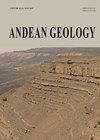Integrated U-Pb and Hf zircon and whole-rock Nd isotopes studies of Devonian granitic rocks from Sierra de San Luis (Sierras Pampeanas, Argentina): Petrogenetic implications
IF 1.2
4区 地球科学
Q3 GEOLOGY
引用次数: 0
Abstract
Previous geochronological data indicate a protracted Devonian magmatic activity developed in the Sierra de San Luis, Sierras Pampeanas of Argentina, with three major crystallization events: 393±3, 384±2, and 377±2 Ma. Previously reported whole-rock Sm-Nd isotopes data define two average distinctive εNdt values: -1.37 and -3.47, and they are consistent with new data presented here. The first signature is assumed for a parental magma with dominant metasomatized subcontinental lithospheric mantle (SCLM) source, whereas the second signature could represent a parental magma derived of a lower continental crust source hybridized with magmas of the first signature. Notably, the new zircon Hf isotopes performed on the same zircon domains that were previously dated, indicate that the contribution of the source was variable over time. In situ Hf in zircon is relevant to evaluate the compositional evolution of the Devonian granitic magmas in the Sierra de San Luis, since the high variability of the εHft values recorded in zircons indicate that the calculated εNdt values for the samples can only be interpreted as a final picture of the petrogenetic process. Zircon Hf isotopes data suggest that the zircon crystallized from a magma with variable composition, recording two major events, yielding two εHft signatures: (1) -3.54 and (2) -6.85. A third composition, yield a less representative εHft value of -5.44, and represent a εHft signature (3).圣路易斯山脉(Sierras Pampeanas,阿根廷)泥盆纪花岗岩的U-Pb、Hf锆石和全岩Nd同位素综合研究:岩石学意义
先前的地质年代数据表明,在阿根廷Sierras Pampeanas的Sierras de San Luis地区发育了一个旷日持久的泥盆纪岩浆活动,有三个主要的结晶事件:393±3、384±2和377±2 Ma。先前报道的全岩Sm-Nd同位素数据定义了两个不同的平均εNdt值:-1.37和-3.47,它们与本文提供的新数据一致。第一个特征被认为是具有主要交代次大陆岩石圈地幔(SCLM)来源的母岩浆,而第二个特征可能代表由与第一个特征的岩浆杂交的下大陆地壳来源衍生的母岩浆。值得注意的是,在先前测年的相同锆石域上进行的新锆石Hf同位素表明,来源的贡献随着时间的推移而变化。锆石中的原位Hf与评估圣路易斯山脉泥盆纪花岗质岩浆的成分演化有关,因为锆石中记录的εHft值的高度可变性表明,样品的计算εNdt值只能解释为岩石成因过程的最终图像。锆石Hf同位素数据表明,锆石由成分可变的岩浆结晶而成,记录了两个主要事件,产生了两个εHft特征:(1)-3.54和(2)-6.85。第三个组成,产生代表性较小的εHft值-5.44,并代表εHft特征(3)。
本文章由计算机程序翻译,如有差异,请以英文原文为准。
求助全文
约1分钟内获得全文
求助全文
来源期刊

Andean Geology
地学-地质学
CiteScore
3.90
自引率
0.00%
发文量
17
审稿时长
>12 weeks
期刊介绍:
This journal publishes original and review articles on geology and related sciences, in Spanish or English, in three issues a year (January, May and September). Articles or notes on major topics of broad interest in Earth Sciences dealing with the geology of South and Central America and Antarctica, and particularly of the Andes, are welcomed.
The journal is interested in publishing thematic sets of papers and accepts articles dealing with systematic Paleontology only if their main focus is the chronostratigraphical, paleoecological and/or paleogeographical importance of the taxa described therein.
 求助内容:
求助内容: 应助结果提醒方式:
应助结果提醒方式:


